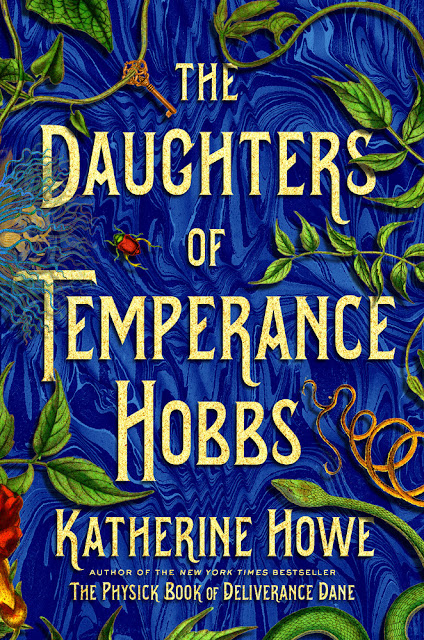EXCERPT and GIVEAWAY
The Daughters of Temperance Hobbs
(The Physick Book 2)
(The Physick Book 2)
by Katherine Howe
The Daughters of Temperance Hobbs is the second book in The Physick series by Katherine Howe. Also available: The Physick Book of Deliverance Dane.
The Daughters of Temperance Hobbs is currently on tour with Great Escapes Virtual Book Tours. The tour stops here today for an excerpt and a giveaway. Please be sure to visit the other tour stops as well.
Description
New York Times bestselling author Katherine Howe returns to the world of The Physick Book of Deliverance Dane with a bewitching story of a New England history professor who must race against time to free her family from a curse.
Connie Goodwin is an expert on America’s fractured past with witchcraft. A young, tenure-track professor in Boston, she’s earned career success by studying the history of magic in colonial America - especially women’s home recipes and medicines - and by exposing society’s threats against women fluent in those skills. But beyond her studies, Connie harbors a secret: She is the direct descendant of a woman tried as a witch in Salem, an ancestor whose abilities were far more magical than the historical record shows.
When a hint from her mother and clues from her research lead Connie to the shocking realization that her partner’s life is in danger, she must race to solve the mystery behind a hundreds’-years-long deadly curse.
Flashing back through American history to the lives of certain supernaturally gifted women, The Daughters of Temperance Hobbs affectingly reveals not only the special bond that unites one particular matriarchal line, but also explores the many challenges to women’s survival across the decades - and the risks some women are forced to take to protect what they love most.
Excerpt
Cambridge, Massachusetts
Early February 2000
Early February 2000
“It would appear that we are nearly out of time,” Janine Silva said, eying her vintage Spiro Agnew wristwatch, and Connie Goodwin’s vision blurred with a surreal sense of déjà vu.
For six years, every major event of her graduate student life had taken place in this room. The new student welcome reception was held here—Connie had worn flip-flops, of course, which was appalling, but true. Her reading seminars were taught here. Her oral exams—the longest four hours of her life, so stressful that she had basically blocked them out the moment they were over. That was here too. Her practice job talk, before a panel of fellow doctoral candidates each wanting to ask a question more probing and picayune than the next, also here. And the dreadful, stultifying holiday parties, year after year, which she’d attended mainly so that she and her roommate Liz Dowers—Liz of the half-dimple smile and ability to actually lecture in medieval Latin—could make off with the cheese platter at the end. Years and years she had spent trapped in this room, like Theseus in the Labyrinth, an endless vista of sameness around this one conference table. And then, all at once, never again. Not since her final defense. In, what? 1995. Five years. A long time. And not a long time at all.
The room itself was essentially the same as she remembered. Pitted conference table, with a few fresh pairs of initials here and there, tattooed into the wood with ballpoint pen. The same stained blackboard, now hidden behind a freestanding whiteboard with an announcement for an undergrad study break next week—free pizza!—in blue dry-erase marker. The same white-whiskered portrait of an anonymous old man, gazing boringly out at his own receding importance. The same grimy window, with the same shutters, now pinned open to catch what remained of the thin winter light. Four in the afternoon, and already almost dark. February was the cruelest month in New England.
Janine Silva, chair of the newly renamed Committee on Degrees in Women’s, Gender, and Sexuality Studies, folded her hands in front of her and smiled at the faces assembled around the table.
“I believe we have time for one more question,” Professor Silva said. “Who would like to do the honors?”
Janine looked expectantly into each face in turn. To Janine’s left, Marcus Hayden, specialist in African American history, newly lured from Dartmouth with tenure and, it was rumored, a house in Belmont for him and his wife and four (four!) children. Marcus was a superstar. He’d gotten the Bancroft history prize with his first book (first!), and he appeared regularly as a commentator on cable news networks. He was the kind of guy Connie found herself thinking about in parenthetical interjections (a Bancroft!). If he had any shortcoming at all, it was that Marcus knew he was a superstar. He’d barely acknowledged Connie when she came into the room. He was cordial to Janine, but in an aloof, superstarish way. He had no notes in front of him, and was also looking at his watch—an expensive one. Well-cut sport coat and no tie. Too handsome for a tie. He had already moved on from this otherwise unmemorable afternoon. No way would the last question come from him.
To Janine’s right, Professor Harold Beaumont leaned back in his library chair, eyelids heavy, fingers knitted over his sweatered belly. Professor Beaumont had published a thousand-page Civil War monograph twenty-one years ago, with a university press that listed it for sale in hardcover at a cost of eighty-nine dollars (all but guaranteeing it would never be adopted for any course), and then he’d settled into tenure with comfortable indifference. Connie doubted he remembered having been on her own orals committee. Or if he did, he didn’t much care. He passed his days teaching one seminar a year, generally consisting of no more than four students at a time (they all had to buy his book), writing a regular column for the National Review, and going on cable news shows, though not the same channels as Professor Hayden. He had notes between his hands, the selfsame typewritten ones that he took to every examination like this one, but Connie was reasonably certain that he was about to fall asleep.
On the opposite side of the table, eyes wide, buttoned into an ill-fitting navy blue blazer that had the look of being borrowed from a friend, radiating the vibrating crackles of panic that perhaps Connie alone around the table could remember having felt, sat the reason for this gathering—a young, curly-headed graduate student named Esperanza Molina. Zazi, to her friends. Enduring the longest four hours of her entire life up to this point. Five pounds skinnier from months of studying. Light-headed, desperate for escape. Hands tightly folded, thumbs crossed as if in prayer. Her eyes met Connie’s and begged, Please let this be over.
“I’ll do it,” Connie said.
Janine beamed. “Professor Goodwin? By all means. Go ahead.”
“Miss Molina.” Connie leaned her elbows on the table and looked pointedly at the young woman—girl, really. Grad students looked younger to Connie every year. “Would you kindly provide the committee with a concise but complete history of witchcraft in North America?”
The second hand ticked on Connie’s watch. And kept ticking. It ticked long enough that Connie noticed it ticking. Her question was meant to be a lob. An easy tossup that Zazi could smash into the corner of the court—Connie had never actually played tennis, but same difference—and go out of her oral qualifying exam with a bang. This was a gimme question. Zazi’s eyes were open so wide that Connie could almost see the whites around her irises. What was happening in there? Was Zazi hunting through all her mental index cards—she probably didn’t use index cards, none of the grad students did anymore—shuffling through drawer after drawer, looking for the answer and finding them empty? What would Connie do if Zazi couldn’t answer? She would have to throw her a life preserver. Give her a hint or something.
Connie glanced at the other professors around the table, weighing how a life-preserver hint would go down, and what it might mean for Zazi passing the exam. Janine would probably let it slide. Maybe. Depending on how she felt about Zazi’s writing. Harold? Oh, he wouldn’t care, would he? Unless he felt like causing a problem just because he could. Connie wouldn’t put it past him. Plenty of professors—more than she’d like to acknowledge—took more pleasure from exercising their power over their students than they did in seeing their students succeed. She glared at him as she thought this, but he didn’t notice. And what about Marcus? His lips pressed together, flattening his mouth. Dammit. No way would he give Zazi a pass. No freaking way.
Zazi straightened in her chair, drawing her shoulders back and lifting her chin. She looked from one professor’s face to another, settling at last on Connie.
“Northeast, South, or Southwest?” Zazi said.
Image created using MockupShots. Get started for FREE here.
Praise for the Book
“The story is full of academic research and family history but is never dull. It is a wonderful story of family and love, with a little magic thrown in.” ~ The Book’s the Thing
“Compelling in a more scholarly way, The Daughters of Temperance Hobbs tells an interesting tale of witchcraft and one family’s fight to survive.” ~ Cozy Up With Kathy
“The Daughters of Temperance Hobbs has a fatal curse, a concealed spell, an antique skeleton key, a spellbinding tome, a magical lineage, and daring witches.” ~ The Avid Reader
“The Daughters of Temperance Hobbs combines exacting historical research with compelling, imaginative storytelling. There is real magic at work in this book, which illuminates, like a candle in the dark, the enduring courage, wisdom, and searing power of women, passed down through countless generations.” ~ Kathleen Kent, New York Times bestselling author of The Heretic's Daughter
“Katherine Howe invites us into a richly imagined, intricate world of family curses and secrets waiting to be unlocked. Elegant, twisty, and timely, The Daughters of Temperance Hobbs has it all.” ~ Matthew Pearl, New York Times bestselling author of The Dante Chamber and The Dante Club
About the Author
Katherine Howe is the author of the New York Times bestsellers The Physick Book of Deliverance Dane and The House of Velvet and Glass, as well as the young adult novels Conversion and The Appearance of Annie van Sinderen. She served as editor of The Penguin Book of Witches and her fiction has been translated into over twenty languages. Descended from three women who were tried for witchcraft in Salem, she and her family live in New England and New York City, where she is at work on her next novel.
Giveaway
Enter the tour-wide giveaway for a chance to win a print copy of The Daughters of Temperance Hobbs by Katherine Howe (US only).
Links
Featured in this post:





